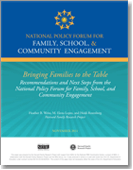The Harvard Family Research Project separated from the Harvard Graduate School of Education to become the Global Family Research Project as of January 1, 2017. It is no longer affiliated with Harvard University.

|
November 2011 Bringing Families to the Table: Recommendations and Next Steps from the National Policy Forum for Family, School, and Community EngagementHeather B. Weiss, Elena Lopez & Heidi Rosenberg |
Article Information
- Full Text (HTML)
- Full Text (PDF: 195 kb)
To be effective, family, school, and community engagement (FSCE) should be a shared responsibility among all parties, should be continuous from birth to young adulthood, and should take place wherever children learn—in the home, school, and community. Yet, until now, family engagement provisions in federal policies and programs have been piecemeal and insufficient.
Recognizing this problem, the U.S. Department of Education convened a National Policy Forum on Family, School, and Community Engagement in November 2010 to spark new ideas for federal, state, and local policies that can drive these opportunities. A diverse group of parents, community members, education practitioners, philanthropists, and representatives from federal and state agencies shared ideas to help develop a policy strategy that fosters systemic, integrated, and sustainable FSCE in support of student learning.
One year later, this report looks back at the major themes of the Forum discussions and offers a set of recommendations for driving family engagement in education as we move forward. These recommendations include:
- Recognize family and community engagement as an essential ingredient of student success and meaningful education reform.
- Create capacity-building mechanisms to advance systemic family and community engagement.
- Develop concrete indicators of success for family and community engagement initiatives.
- Create opportunities for blended funding to promote greater cross-agency and cross-level program collaboration.
- Require comprehensive family engagement plans aligned with measurable outcomes in family engagement provisions in federal and state legislation.
- Provide clear expectations for how states, districts, and schools should engage families as part of federal grant programs.
- Use education data to promote meaningful continuous improvement, rather than for compliance purposes.
- Make data actionable by having them reveal how a child’s skills are progressing over time, rather than simply providing performance assessments based on one-time tests.
- Emphasize data sharing as a key strategy to empower families to have meaningful conversations with school staff about their child’s performance.
ABOUT THE NATIONAL POLICY FORUM FOR FAMILY, SCHOOL, & COMMUNITY ENGAGEMENT
This forum—hosted by the U.S. Department of Education on November 9, 2010—brought together education thought leaders to help inform the Department’s family, school, and community engagement strategy. Harvard Family Research Project and SEDL helped facilitate the event in Washington, DC, and wrote the Working Paper which served as the foundation for the proceedings. At the forum, over two dozen experts engaged in dynamic, interactive discussions about the role of family, school, and community engagement in education reform, providing insights based on their own work and identifying new directions for family engagement in the coming years.
